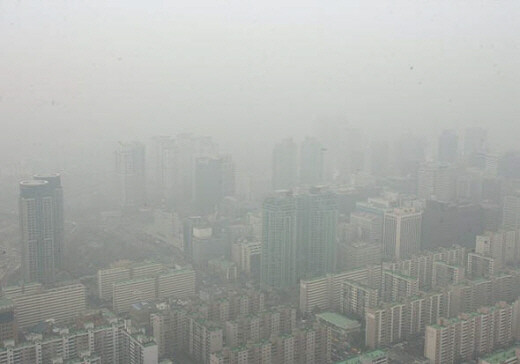hankyoreh
Links to other country sites 다른 나라 사이트 링크
Transportation-related greenhouse gas emissions double the 1990 figures

The Ministry of Land, Transport and Maritime Affairs (MLTM) released its "Study of 2007 Greenhouse Gas Emissions for the Transportation Sector by Region and Means of Transportation." The report shows South Korea's transportation-related greenhouse gas emissions exceeded 100 million tons in 2007. Highway traffic emissions were the highest among means of transportation. Seoul and the capital region accounted for around half of all emissions.
The report also reveals that greenhouse gas emissions in the transportation sector have for the first time exceeded 100 million, registering at some 100,980,000 carbon dioxide equivalent tons (a measure converting various greenhouse gases into the standard of CO₂emissions, hereafter "tons"). This is an increase of 2.4 times the 42.92 million tons emitted in 1990. Greenhouse gas emissions increased by 7.5 percent per year on average between 1990 and 2000, and since then have shown an annual rate of increase of between 2 and 3 percent.
Emissions by means of transportation were highest for highway traffic, at 78.48 million tons (77.7 percent), followed in order by: sea transport (12.86 million tons, 12.7 percent), air transport (8.97 million tons, 8.9 percent) and rail transport (6.7 million tons, 0.7 percent).
The capital region accounted for some 44.7 percent of emissions nationwide, with Gyeonggi Province emitting 19.98 million tons (19.8 percent), Incheon 12.61 million tons (12.5 percent) and Seoul 12.49 million tons (12.4 percent). Busan follows in emission levels of 8.44 million tons (8.4 percent), South Gyeongsang Province at 6.27 million tons (6.2 percent), and Ulsan at 6.16 million (6.1 percent). In 2005, South Korea's annual per capita greenhouse gas emissions of 9.30 tons were similar to those of Japan's 9.50 tons and Germany's 9.86 tons. However, the annual rate of change of 0.28 percent is higher than those of Great Britain's -0.20percent and Germany's -0.56 percent.
"Since South Korea is expected to be included among the target nations for obligatory greenhouse gas reductions beginning in 2013, we need to prepare for greenhouse gas reductions at the national level, including encouraging greater public transportation use and the building of a green transportation network," said a source at the MLTM.
Please direct questions or comments to [englishhani@hani.co.kr]
Editorial・opinion
![[Editorial] Does Yoon think the Korean public is wrong? [Editorial] Does Yoon think the Korean public is wrong?](https://flexible.img.hani.co.kr/flexible/normal/500/300/imgdb/original/2024/0417/8517133419684774.jpg) [Editorial] Does Yoon think the Korean public is wrong?
[Editorial] Does Yoon think the Korean public is wrong?![[Editorial] As it bolsters its alliance with US, Japan must be accountable for past [Editorial] As it bolsters its alliance with US, Japan must be accountable for past](https://flexible.img.hani.co.kr/flexible/normal/500/300/imgdb/original/2024/0417/6817133413968321.jpg) [Editorial] As it bolsters its alliance with US, Japan must be accountable for past
[Editorial] As it bolsters its alliance with US, Japan must be accountable for past- [Guest essay] Amending the Constitution is Yoon’s key to leaving office in public’s good graces
- [Editorial] 10 years on, lessons of Sewol tragedy must never be forgotten
- [Column] A death blow to Korea’s prosecutor politics
- [Correspondent’s column] The US and the end of Japanese pacifism
- [Guest essay] How Korea turned its trainee doctors into monsters
- [Guest essay] As someone who helped forge Seoul-Moscow ties, their status today troubles me
- [Editorial] Koreans sent a loud and clear message to Yoon
- [Column] In Korea’s midterm elections, it’s time for accountability
Most viewed articles
- 1[Column] The clock is ticking for Korea’s first lady
- 2Samsung barricades office as unionized workers strike for better conditions
- 3[Editorial] When the choice is kids or career, Korea will never overcome birth rate woes
- 4Why Israel isn’t hitting Iran with immediate retaliation
- 5[News analysis] After elections, prosecutorial reform will likely make legislative agenda
- 6[Editorial] Does Yoon think the Korean public is wrong?
- 7S. Korea, Japan reaffirm commitment to strengthening trilateral ties with US
- 8[Editorial] As it bolsters its alliance with US, Japan must be accountable for past
- 9Japan officially says compensation of Korean forced laborers isn’t its responsibility
- 10Faith in the power of memory: Why these teens carry yellow ribbons for Sewol